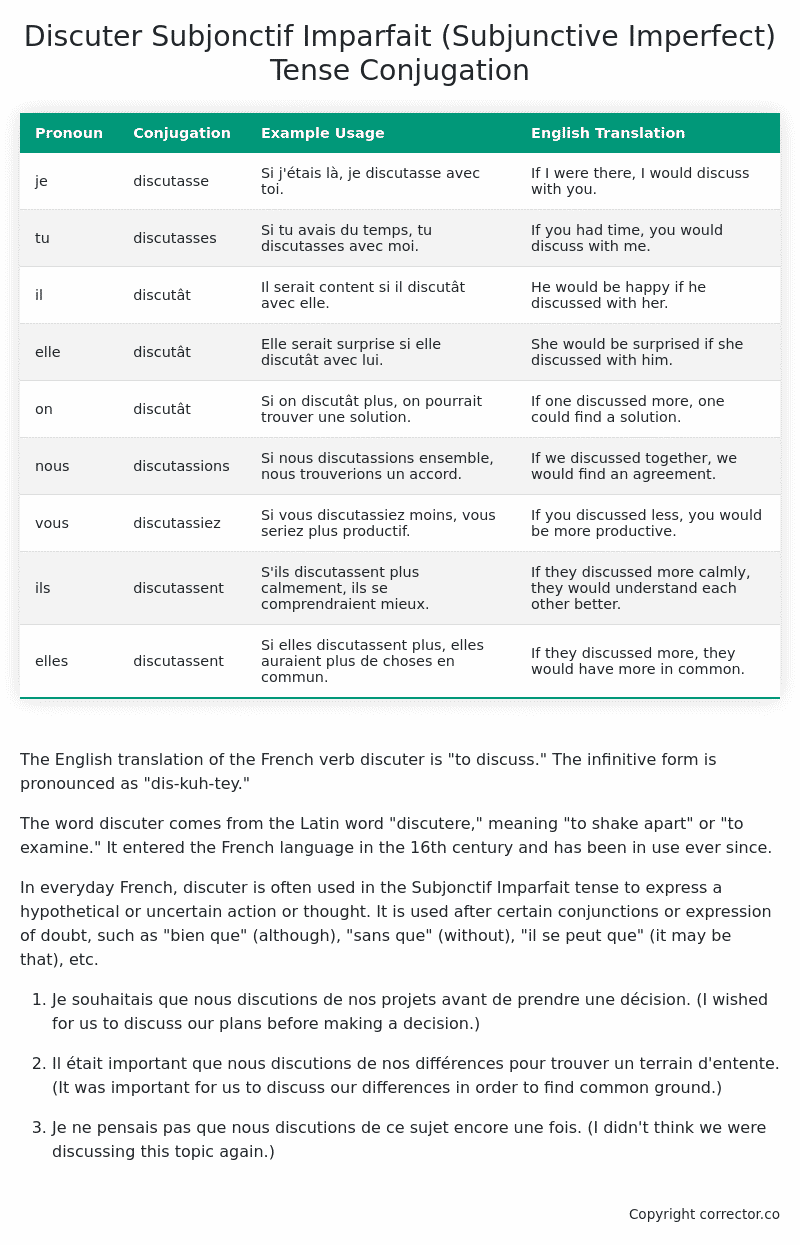Subjonctif Imparfait (Subjunctive Imperfect) Tense Conjugation of the French Verb discuter
Introduction to the verb discuter
The English translation of the French verb discuter is “to discuss.” The infinitive form is pronounced as “dis-kuh-tey.”
The word discuter comes from the Latin word “discutere,” meaning “to shake apart” or “to examine.” It entered the French language in the 16th century and has been in use ever since.
In everyday French, discuter is often used in the Subjonctif Imparfait tense to express a hypothetical or uncertain action or thought. It is used after certain conjunctions or expression of doubt, such as “bien que” (although), “sans que” (without), “il se peut que” (it may be that), etc.
-
Je souhaitais que nous discutions de nos projets avant de prendre une décision. (I wished for us to discuss our plans before making a decision.)
-
Il était important que nous discutions de nos différences pour trouver un terrain d’entente. (It was important for us to discuss our differences in order to find common ground.)
-
Je ne pensais pas que nous discutions de ce sujet encore une fois. (I didn’t think we were discussing this topic again.)
Table of the Subjonctif Imparfait (Subjunctive Imperfect) Tense Conjugation of discuter
| Pronoun | Conjugation | Example Usage | English Translation |
|---|---|---|---|
| je | discutasse | Si j’étais là, je discutasse avec toi. | If I were there, I would discuss with you. |
| tu | discutasses | Si tu avais du temps, tu discutasses avec moi. | If you had time, you would discuss with me. |
| il | discutât | Il serait content si il discutât avec elle. | He would be happy if he discussed with her. |
| elle | discutât | Elle serait surprise si elle discutât avec lui. | She would be surprised if she discussed with him. |
| on | discutât | Si on discutât plus, on pourrait trouver une solution. | If one discussed more, one could find a solution. |
| nous | discutassions | Si nous discutassions ensemble, nous trouverions un accord. | If we discussed together, we would find an agreement. |
| vous | discutassiez | Si vous discutassiez moins, vous seriez plus productif. | If you discussed less, you would be more productive. |
| ils | discutassent | S’ils discutassent plus calmement, ils se comprendraient mieux. | If they discussed more calmly, they would understand each other better. |
| elles | discutassent | Si elles discutassent plus, elles auraient plus de choses en commun. | If they discussed more, they would have more in common. |
Other Conjugations for Discuter.
Le Present (Present Tense) Conjugation of the French Verb discuter
Imparfait (Imperfect) Tense Conjugation of the French Verb discuter
Passé Simple (Simple Past) Tense Conjugation of the French Verb discuter
Passé Composé (Present Perfect) Tense Conjugation of the French Verb discuter
Futur Simple (Simple Future) Tense Conjugation of the French Verb discuter
Futur Proche (Near Future) Tense Conjugation of the French Verb discuter
Plus-que-parfait (Pluperfect) Tense Conjugation of the French Verb discuter
Passé Antérieur (Past Anterior) Tense Conjugation of the French Verb discuter
Futur Antérieur (Future Anterior) Tense Conjugation of the French Verb discuter
Subjonctif Présent (Subjunctive Present) Tense Conjugation of the French Verb discuter
Subjonctif Passé (Subjunctive Past) Tense Conjugation of the French Verb discuter
Subjonctif Imparfait (Subjunctive Imperfect) Tense Conjugation of the French Verb discuter (this article)
Subjonctif Plus-que-parfait (Subjunctive Pluperfect) Tense Conjugation of the French Verb discuter
Conditionnel Présent (Conditional Present) Tense Conjugation of the French Verb discuter
Conditionnel Passé (Conditional Past) Tense Conjugation of the French Verb discuter
L’impératif Présent (Imperative Present) Tense Conjugation of the French Verb discuter
L’infinitif Présent (Infinitive Present) Tense Conjugation of the French Verb discuter
Struggling with French verbs or the language in general? Why not use our free French Grammar Checker – no registration required!
Get a FREE Download Study Sheet of this Conjugation 🔥
Simply right click the image below, click “save image” and get your free reference for the discuter Subjonctif Imparfait tense conjugation!

Discuter – About the French Subjonctif Imparfait (Subjunctive Imperfect) Tense
Formation
Common Everyday Usage Patterns
Interactions with Other Tenses
Subjonctif Présent
Indicatif Passé Composé
Conditional
Conditional Perfect
Summary
I hope you enjoyed this article on the verb discuter. Still in a learning mood? Check out another TOTALLY random French verb conjugation!


